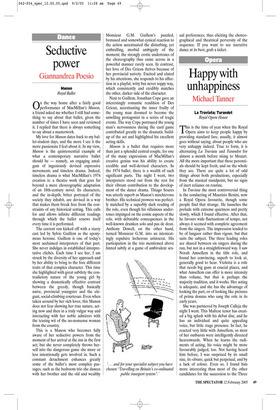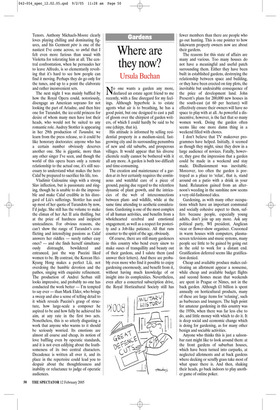Happy with unhappiness
Michael Tanner
La Traviata; Turandot Royal Opera House This is the time of year when the Royal Opera aims to keep people happy by providing standard fare, usually, it almost goes without saying, about people who are very unhappy indeed. True to form, it is alternating La Traviata and Turandot for almost a month before rising to Mozart. All the more important that these perennials should be kept fresh, and on the whole they are. There are quite a lot of odd things about both productions, especially from the musical standpoint, but no signs of inert reliance on routine.
In Traviata the most controversial thing is the conducting of Maurizio Benini, now a Royal Opera favourite, though some people find that strange. He launches the prelude with extreme quietness and pretty slowly, which I found effective. After that, he favours wide fluctuations of tempo, not always it seemed with complete agreement from the singers. The impression tended to be of languor rather than vigour, but that suits the subject. The three leading roles are shared between six singers during the run, but not in a straightforward way. I saw Norah Amsellem in the title role, and found her convincing, superb to look at, generally good to hear. Violetta is a role that needs big guns at crucial places, and what Amsellem can offer is more intensity than volume, but that is perhaps the majority tradition, and it works. Her acting is adequate, and she has the advantage of looking the part, or of looking like pictures of prima donnas who sang the role in its early years.
She was partnered by Joseph Calleja the night I went. This Maltese tenor has created a big splash with his debut disc, and he has an individual and quite appealing voice, but little stage presence. In fact, he reacted very little with Amsellem, so most of her outbursts were intelligently directed heavenwards. When he learns the rudiments of acting, his voice might be more favourably judged, too. Not having heard him before, I was surprised by its small size, its vibrato, quick but perpetual, and by a lack of colour. Even so, I found him more interesting than most of the other candidates for the succession to the Three Tenors. Anthony Michaels-Moore clearly loves playing chilling and dominating figures, and his Germont père is one of the nastiest I’ve come across, so awful that I felt even more furious than usual with Violetta for tolerating him at all. The central confrontation, when he persuades her to leave Alfredo, is so elementarily revolting that it’s hard to see how people can find it moving. Perhaps they do go only for the tunes, and up to a point the elaborate and rather inconvenient sets.
The next night I was mainly baffled by how the Royal Opera could, notoriously, disengage an American soprano for not looking the part of Ariadne, and then hire one for Turandot, the ice-cold princess for desire of whom many men have lost their heads, who would not be suited to any romantic role. Audrey Stottler is appearing in her 29th production of Turandot, we learn from the press release, so it could be like honorary doctorates: anyone who has a certain number obviously deserves another one. She is gigantic, more than any other singer I’ve seen, and though the world of this opera bears only a remote relationship to the actual one, it’s still necessary to understand what makes the hero Calaf be prepared to sacrifice his life, too.
Vladimir Galouzine sings with a strong Slav inflection, but is passionate and ringing, though he is unable to do the impossible and make Calaf credible in his disregard of Liù’s sufferings. Stottler has used up most of her quota of Turandots by now, I’d judge. She still has the volume to make the climax of her Act II aria thrilling, but at the price of hardness and incipient unsteadiness. For obvious reasons, she can’t show the range of Turandot’s conflicting and intensifying passions as Calaf answers her riddles — surely rather easy ones? — and she finds herself simultane ously distraught, bewildered and entranced, just the way Puccini liked women to be. By contrast, the Korean HeiKyung Hong makes a perfect Liù, not overdoing the humble devotion and the pathos, singing with exquisite refinement. The production of Andrei Serban still looks impressive, and probably no one has conducted the work better — I’m tempted to say ever — than Mark Elder, who brings a sweep and also a sense of telling detail to it which reveals Puccini’s grasp of structure, how large-scale a composer he aspired to be and how fully he achieved his aim, at any rate in the first two acts. Nonetheless, this is so utterly disgusting a work that anyone who warms to it should be seriously worried. Its emotions are almost all coarse and cheap, its notion of love baffling even by operatic standards, and it is not even edifying about the loathsomeness of its two central characters. Decadence is written all over it, and its place in the repertoire could lead you to despair about the thoughtlessness and inability or reluctance to judge of operatic audiences.














































 Previous page
Previous page